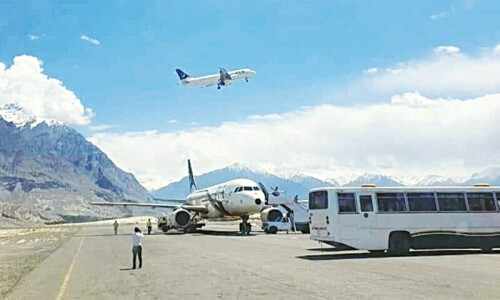ISLAMABAD: The sponsors of an upcoming new ‘integrated’ liquefied natural gas (LNG) terminals have opposed unlimited capacity enhancement to government-guaranteed existing ‘un-bundled’ LNG terminals, saying such a move would monopolise the market and discourage new investment to set up merchant terminals.
In a letter to the Oil & Gas Regulatory Authority (Ogra), Tabeer Energy Pakistan Limited (TEPL) — a 100 per cent subsidiary of Mitsubishi Corporation of Japan — warned that the draft LNG Terminal Access Rules and Codes would “discourage new LNG terminal investors seeking to build integrated projects” without any government guarantee at Port Qasim.
Tabeer is one of two upcoming integrated LNG terminals currently at the last leg of final investment decision. The draft LNG terminal access rules and code would not effectively promote competition in terms of the contracting of terminal capacity and subsequent sales of regasified liquefied natural gas (RLNG) from such terminals and would not be aligned with the current and planned navigational access to Port Qasim, Tabeer said.
Main channel is said to be already under stress when handling vessels with current terminal capacity
It said the draft rules were inconsistent with the LNG Policy 2011 of the government and Ogra’s LNG Rules 2007 as they have not differentiated between projects that have been awarded construction or operation licences on either an “integrated” basis or an “unbundled” basis. The Ogra had also previously issued licences to terminal operators based on this categorisation.
Tabeer said LNG terminals constructed thus far were set up on an “unbundled” basis under which throughput and thus the capacity tariff had been guaranteed by the government. However, the new “integrated” LNG terminals that have been awarded licences of the same title by Ogra had to undertake the entire throughput risk without any form of governmental support or guarantee.
It would, therefore, be important that any spare or excess capacity on “unbundled” projects, which have been established on tenders from the government, should be allocated under a bidding process that is compliant to the public procurement rules to increase transparency and competition in allocation of terminal capacity. The spare or additional capacities on “unbundled” existing terminals should be capped, so as not to further risk the navigational access to the port, and instead be subject to bidding process which will also increase competition in the RLNG market of Pakistan.
This would also prevent monopolisation of terminal capacity as terminal owners were also potential sellers of RLNG to customers and ensure that a distinction was still applied between unbundled project and the integrated projects as per the LNG Policy 2011. Moreover, this will ensure that the rules were consistent with the Ogra Third Party Access Rules 2018 for pipeline capacity access, which require transporters to follow a similar allocation mechanism.
It said that if an “unbundled” project established on a tender from the government was granted the right to allocate such capacity and at the same time, be involved in the sale of RLNG, this would result in a conflict of interest situation where the buyer and the seller were the same entity.
Moreover, such a scenario would discourage new LNG terminal investors seeking to build integrated projects using a Floating Storage Regasification Unit can easily be chartered or ordered bearing larger capacities. If Ogra were to allow capacity enhancements on existing terminals to continue with no ceiling, existing terminals in the main channel could potentially expand perpetually and without limitation, which could in turn result in the choking the main channel at Port Qasim and stressing the LNG supply chain.
Allowing terminals to expand beyond what their construction or operation licences permit and with no ceiling would also be inconsistent with both the current and the planned navigational access at the port. “It is well known and documented that the main channel at the Port is already under considerable stress when handling LNG vessels at the current terminal capacities,” Tabeer said.
TEPL said it required to pay $10 million as a concession fee to the Port Qasim Authority and already expended millions of dollars towards technical studies to ensure its terminal was in compliance with LNG Policy 2011, OGRA Rules 2007 and other applicable regulatory statutes.
The proposed “rules and/or policies have not envisaged that “Integrated” projects are required to disclose material/proprietary information such as toll charges, capacity use agreements, etc, especially when the intended terminal use is for captive purposes.
Published in Dawn, August 19th, 2021
















































